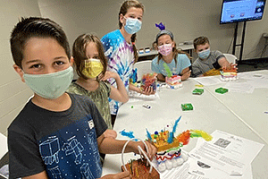Emotional support may help control eczema
Camp Discovery
At AAD's Camp Discovery, spending time with other children who have a skin condition can boost self-esteem, reduce stress, and ease feelings of “being alone

If your child seems sad, lonely, or anxious, you may want to mention this to your child’s dermatologist. Research shows that helping your child feel better emotionally can reduce eczema flares.
Your dermatologist can offer suggestions that are appropriate for your child, which may include:
Camp Discovery (American Academy of Dermatology)
A summer camp open to children ages 8 to 16 who have a chronic skin condition.
All costs, including transportation to and from camp, are covered.
Kids receive expert medical care from dermatologists and dermatologic nurses.
Kids spend a week during the summer with other kids who have a chronic skin condition.
Each child must be referred by a dermatologist.
Patient Conference (National Eczema Association)
Support Groups (National Eczema Association)
Say you care with text messages
For teenagers, a dermatologist may mention an option that may surprise you — text messages.
A study conducted at the Harvard Medical School found that patients with eczema responded well to daily text messages.
The text messages worked so well that most patients:
Stuck to their treatment plan more days per week
Had less eczema in 6 weeks
Wanted to keep receiving text messages
All of the patients in this study had atopic dermatitis, the most common type of eczema. The patients were 14 years of age or older.
Every patient received a daily text message for 6 weeks. The messages reminded them to use their medicine and gave them educational information about atopic dermatitis.
Most patients (90%) said the education information was helpful. And, 85% said the texts reminded them to treat their skin.
WRU W8ing 4? A text message just might be what your teen or tween needs to stick to the treatment plan.
Related AAD resources
Image
American Academy of Dermatology
References Eichenfield LF, Tom WL et al. “Guidelines of care for the management of atopic dermatitis. Section 1: Diagnosis and assessment of atopic dermatitis.” J Am Acad Dermatol 2014 February;70(2):338-51.
Fried RG, Gupta MA, et al. “Depression and skin disease.” Dermatol Clin. 2005;23(4):657-64.
Pena-Robichaux V, Watson AJ, Kvedar JC. “Text messages as a reminder aid and educational tool in adolescents and adults with atopic dermatitis: A pilot study.” Journal of the American Academy of Dermatology. 2010 March;62(3)suppl 1:AB10. Commercial support: None identified.
 Atopic dermatitis: More FDA-approved treatments
Atopic dermatitis: More FDA-approved treatments
 Biosimilars: 14 FAQs
Biosimilars: 14 FAQs
 How to trim your nails
How to trim your nails
 Relieve uncontrollably itchy skin
Relieve uncontrollably itchy skin
 Fade dark spots
Fade dark spots
 Untreatable razor bumps or acne?
Untreatable razor bumps or acne?
 Tattoo removal
Tattoo removal
 Scar treatment
Scar treatment
 Free materials to help raise skin cancer awareness
Free materials to help raise skin cancer awareness
 Dermatologist-approved lesson plans, activities you can use
Dermatologist-approved lesson plans, activities you can use
 Find a Dermatologist
Find a Dermatologist
 What is a dermatologist?
What is a dermatologist?